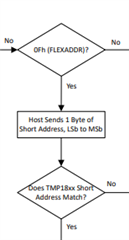Hello everyone,
i am currently writing a driver for the TMP1826. We want to use the flexible address to asign each TMP sensor a fixed address.
I am currently able to read the Temperatur of a single sensor(with the skip address command), read and write the Scratchpad-1 and set the address programmatically. But when i use FLEXADDRESS (0Fh) + address Byte instead of SKIPADDRESS i dont get any results on read.
I couldn´t find an example for the actual use of the FLEXADDRESS command in the TMP datasheet, so I was wondering what i am missing.
Hope you could guide me in the right direction, thanks.
-
Ask a related question
What is a related question?A related question is a question created from another question. When the related question is created, it will be automatically linked to the original question.


